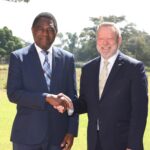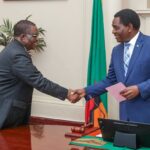Zambia’s President Hakainde Hichilema officiated the launch of The Art of War and Peace, a groundbreaking book co-authored by Greg Mills and Dr. David Kilcullen, at the Defence Services Command and Staff College (DSCSC) in Lusaka. The event, held today, marked the debut of a work that explores military strategies and the critical importance of achieving sustainable peace alongside military victory.
The DSCSC, an institution with historical significance in Southern Africa, was a fitting venue for the book’s unveiling. Known for its emphasis on strategic military education, the college has been central to Zambia’s military training and was pivotal during Southern Africa’s liberation struggles. It was also an operational base for figures such as former South African President Thabo Mbeki during the region’s fight for independence.
In his address, President Hichilema highlighted the book’s relevance to Africa’s current security challenges, stressing the need to plan for peace with the same rigor and foresight applied to military operations. “This masterpiece challenges traditional paradigms and provides practical insights for navigating today’s volatile, uncertain, complex, and ambiguous environment,” he said, underscoring the book’s value in the broader context of regional security.
Additionally, the President called for the strengthening of Zambia’s defense and strategic institutions, emphasizing the operationalization of the National Defence University, established in 2021. He described the university as a crucial step in enhancing Zambia’s ability to address its security challenges effectively, ensuring the country is well-prepared for both defense and peacebuilding efforts.
The launch, however, sparked debate on social media, particularly from former diplomat Emmanuel Mwamba, who raised concerns about the increasing influence of the Brenthurst Foundation—co-founded by Greg Mills—on Zambia’s military and strategic decision-making. In a Facebook post, Mwamba pointed to Mills’ engagement with Zambia’s top military leadership at the event, questioning the potential implications of external influence on the nation’s security policies.
The discussion surrounding The Art of War and Peace reflects broader concerns about the role of foreign expertise in shaping Zambia’s defense strategy, as well as the intersections between military strategy, peacebuilding, and external involvement in national security matters. As Zambia seeks to enhance its defense capabilities, the themes of the book are expected to resonate widely, prompting ongoing conversations about the future of the country’s military and peace initiatives.
The launch of The Art of War and Peace serves as a pivotal moment for Zambia, as it navigates the complex challenges of modern warfare and peacekeeping while striving for greater self-reliance in its strategic affairs.






